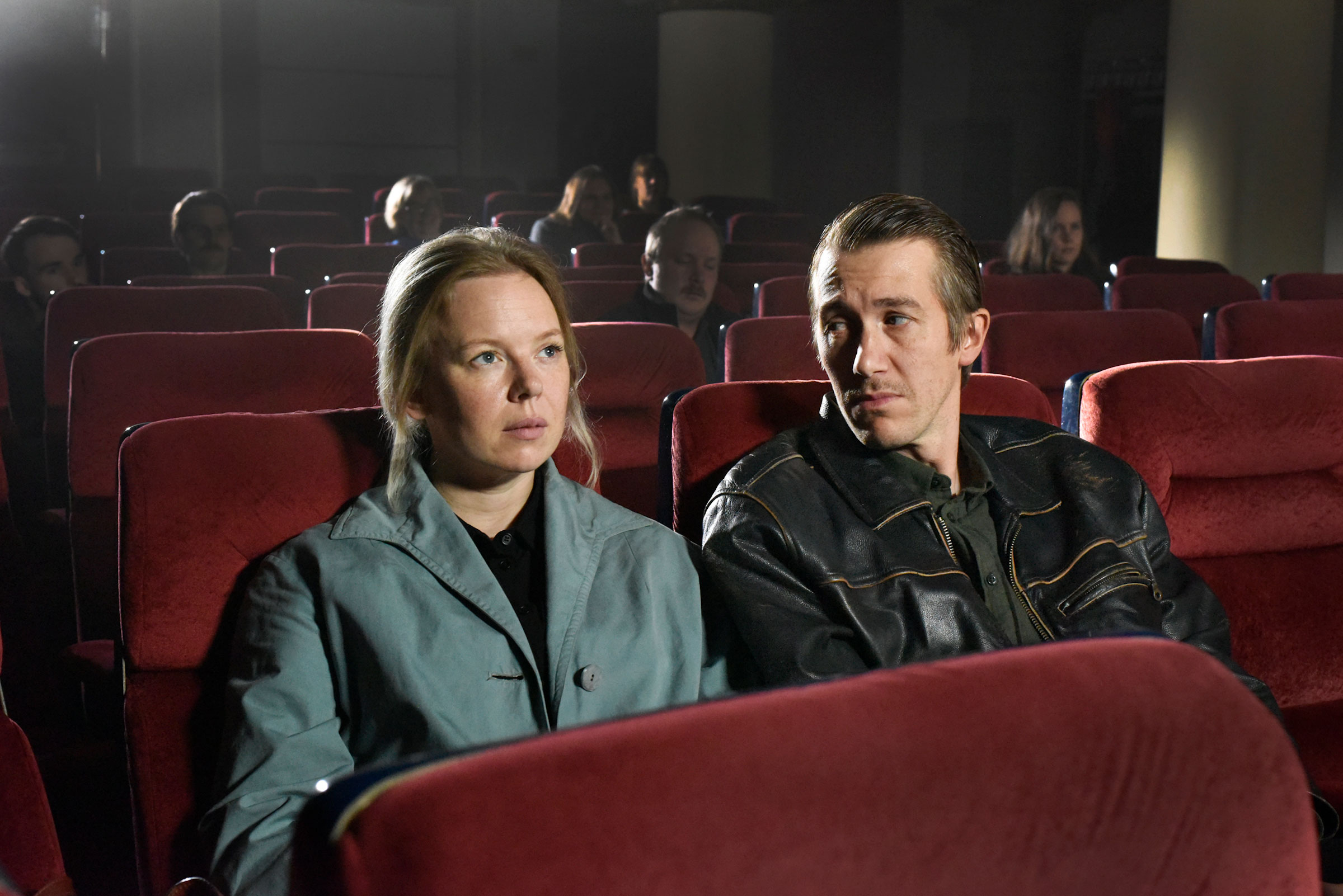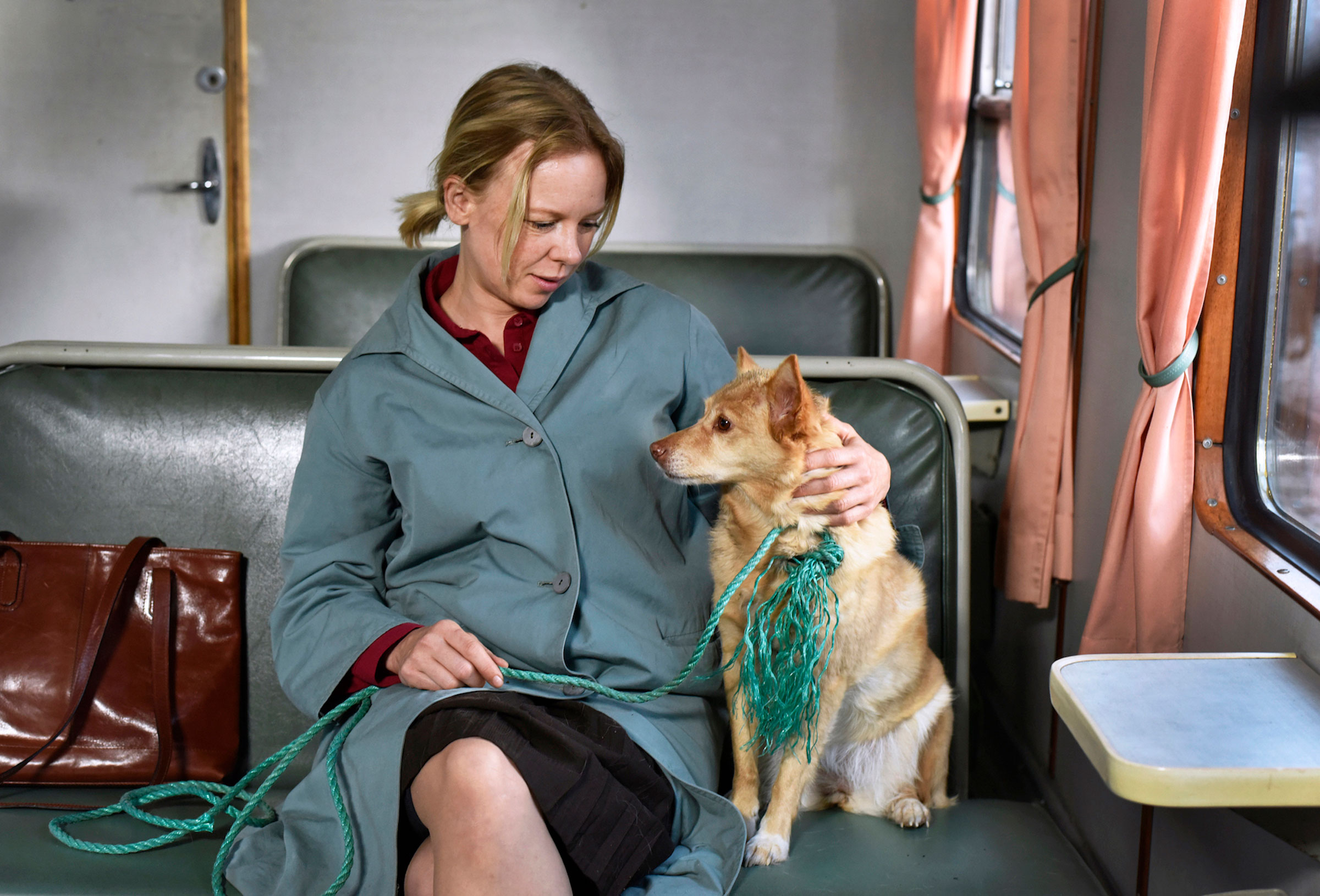Sometimes small miracles appear in the form of movies. This is a type of mysticism even more radical than your random saintly phenomenon, like stigmata or the blocking of the sun, because movies are always commerce: they cost money to make and to see, which should exempt them from all spiritually euphoric experience. Yet sometimes a movie reaches the unreachable in us, not because it’s a grand masterpiece but because it’s as quiet and intimate as air. Sometimes all it takes to turn your world around, for a few hours at least, is a small Finnish movie about a woman unjustly fired from her job, a stubborn drunk guy who knows when he’s hit the wall, and a preternaturally expressive yellow dog.
Fallen Leaves is the 20th movie from Aki Kaurismäki, Finland’s most renowned director but also simply a great one, and its premise is so straightforward it almost feels silly to recount it. A nearing-middle-age woman, living alone in a small, tidy apartment in Helsinki, loses her job stocking food in a market when a mean security guard discovers that she’s hidden an expired prepackaged sandwich in her handbag. She quickly finds another job, washing glasses at a rundown pub—it’s called California Bar, a sunny promise its gray exterior and slumped-over denizens can’t hope to fulfill—but the gig is short-lived; its owner is carted away by the cops for selling drugs, on pay day no less. She’s out of luck and out of money, but as she stands on the street outside her workplace, not knowing what to do, a gaunt, laconic, mournfully charming gentleman she has seen before asks her out for coffee. He knows she’s hungry and buys her a croissant as well—though when she goes to the counter to fetch it, he surreptitiously dumps booze into his coffee cup. He can’t get through the morning without it.
Read more: The 100 Best Movies of the Past 10 Decades
These two lonely people—we’ll later learn their names are Holappa and Ansa, and they’re played by Jussi Vatanen and Alma Pöysti—will embark on a shaky adventure undercut by misunderstandings, missed connections, and Holappa’s excessive drinking. They speak to one another in flattened sentences that are still, somehow, swollen with meaning. After coffee, Holappa asks Ansa if she’d like to go to the cinema. He chooses the movie—it’s The Dead Don’t Die, by Jim Jarmusch, Kaurismäki’s longtime pal and spiritual brother—and they sit solemnly side-by-side as Bill Murray and Adam Driver fend off a townful of zombies. Later, Holappa asks Ansa if she liked the film. “I did,” she says soberly. “I never laughed so much.”

This is the Kaurismäki way, a kind of deadpan joi de vivre that makes his movies sing. You either respond to it or you don’t. I can understand people seeing Fallen Leaves—or any of Kaurismäki’s other films, like the rapturously poker-faced existential comedy I Hired a Contract Killer, or the stranger-in-a-strange-land immigrant parable Le Havre—and shrugging, not thinking of them as such a big deal. But Kaurismäki works magic with understatement, especially in Fallen Leaves, possibly his greatest film. It’s there in his color schemes, the way he lights and composes the vision of these two people going about the business of their lives: In an early scene, Ansa reluctantly boards a bus after seeing Holappa (the two have not yet officially met) passed out at the bus stop, his pockets already having been riffled through by youthful hoodlums, disgruntled to have found nothing. She’d stopped to ask him if he was OK, but he remained sound asleep; you can see she felt powerless to help. The look on her face as she boards that bus, before it goes swooshing into the night, is that of an Edward Hopper heroine, going about her daily business even as she guards the sanctity of her interior life. It is, after all, all she’s got. At home, when she turns on the radio, the news blaring out is terrible: these are reports from the war raging in Ukraine, urgent missives about bombed communities and dead children. Maybe this is Kaurismäki’s way of telling us that because there’s no real refuge from the world’s horrors, every tender connection we make with others matters that much more.
Kaurismäki has such deep affection for his characters—and chooses such subtly expressive actors to bring them to life—that he can never allow them to suffer for long. Ansa and Holappa have an ill-fated dinner date; Ansa tells him that she’s lost family to alcoholism, and she cannot tolerate his drinking. He stomps off angrily, informing her that she can’t tell him what to do. But as he does so, he knows how much he’s losing. Weeks earlier, outside that movie theater, Ansa had kissed his cheek, and as she’d walked off into the night, he touched the side of his face as if to hold that whisper of a kiss there forever. Holappa, a metalworker, keeps losing jobs because of his drinking. Vatunen, sturdy and elegant as a beanpole, plays him as a man so hung up on keeping his dignity that he can’t see the world—or the promise of Ansa—slipping away from him. This is an oversight that Kaurismäki, with his wry generosity, will insist on putting right.

It's not giving too much away to tell you that these lonely lovers eventually connect—you saw it coming, didn’t you? But before that happens, Ansa—it turns out that her name means “trapped” in Finnish—finds another kind of joy, by adopting a winsome street dog that has been wandering around near the factory where she works. (Great dogs are a hallmark of Kaurismäki’s movies.) She brings him home and bathes him. Everything about the moment is beautiful, including the color scheme: she wears a red blouse, the dog’s fur is a soft ochre, she’s rubbing him vigorously with a lavender towel. There’s joy to be found in color, in the companionship of animals, in love that’s hard won. Kaurismäki reopens our eyes to all these things, things we sometimes forget we know. He’s the patron saint of reminding; the miracle, he knows, is already right inside us.
More Must-Reads from TIME
- Caitlin Clark Is TIME's 2024 Athlete of the Year
- Where Trump 2.0 Will Differ From 1.0
- Is Intermittent Fasting Good or Bad for You?
- The 100 Must-Read Books of 2024
- Column: If Optimism Feels Ridiculous Now, Try Hope
- The Future of Climate Action Is Trade Policy
- FX’s Say Nothing Is the Must-Watch Political Thriller of 2024
- Merle Bombardieri Is Helping People Make the Baby Decision
Contact us at letters@time.com